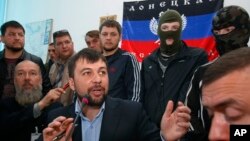With pro-Russian militants refusing to lay down their weapons and evacuate government buildings in Ukraine, the United States says Friday that Russia has a "responsibility" to urge the protesters to comply. There are doubts that Thursday's agreement between the U.S., Russia, Ukraine and the European Union will ease tensions in the region.
Outside the regional administrative headquarters in Donetsk, music blared Friday as Russian flags flapped in the breeze.
Inside, the self-declared leader of the pro-Russian separatists, Denis Pushilin, dismissed efforts to get him and his followers to leave.
"Russia's foreign minister didn't sign for us, he signed for the Russian Federation," Pushilin told journalists.
In Kyiv, Ukrainian Foreign Minister Andriy Deshchytsia warned time was running out. "If this will not start in a few days I think that after the Easter there will be more concrete actions," he said.
Ukraine Wednesday failed to recapture occupied buildings when well-armed pro-Russian separatists seized army vehicles. Retired U.S. Army Brigadier General Ron Mangum said another attempt may not go much better.
"The level of organization of these militias, the armaments that these militias have, that's not something that they would simply accumulate in their homes over the summer for hunting in the fall," said Mangum.
A growing number of high-ranking officials warn there's a high likelihood many of the armed separatists are really Russian forces.
Mangum, now at the private American Military University, said this follows a pattern under Russian President Vladimir Putin, used in Russia's annexation of Crimea last month and during the 2008 Russian invasion of Georgia.
And he said despite NATO's efforts to bolster defenses, the fact that the U.S. and European Union have said there will not be a military solution could be a problem.
"Taking the military option off the table, I think, just says to Russia unless we can put severe economic pressure on them, that's nobody's going to stop them," said Mangum.
The notion has many governments in Central and Eastern Europe worried about what comes next.
Outside the regional administrative headquarters in Donetsk, music blared Friday as Russian flags flapped in the breeze.
Inside, the self-declared leader of the pro-Russian separatists, Denis Pushilin, dismissed efforts to get him and his followers to leave.
"Russia's foreign minister didn't sign for us, he signed for the Russian Federation," Pushilin told journalists.
In Kyiv, Ukrainian Foreign Minister Andriy Deshchytsia warned time was running out. "If this will not start in a few days I think that after the Easter there will be more concrete actions," he said.
Ukraine Wednesday failed to recapture occupied buildings when well-armed pro-Russian separatists seized army vehicles. Retired U.S. Army Brigadier General Ron Mangum said another attempt may not go much better.
"The level of organization of these militias, the armaments that these militias have, that's not something that they would simply accumulate in their homes over the summer for hunting in the fall," said Mangum.
A growing number of high-ranking officials warn there's a high likelihood many of the armed separatists are really Russian forces.
Mangum, now at the private American Military University, said this follows a pattern under Russian President Vladimir Putin, used in Russia's annexation of Crimea last month and during the 2008 Russian invasion of Georgia.
And he said despite NATO's efforts to bolster defenses, the fact that the U.S. and European Union have said there will not be a military solution could be a problem.
"Taking the military option off the table, I think, just says to Russia unless we can put severe economic pressure on them, that's nobody's going to stop them," said Mangum.
The notion has many governments in Central and Eastern Europe worried about what comes next.




